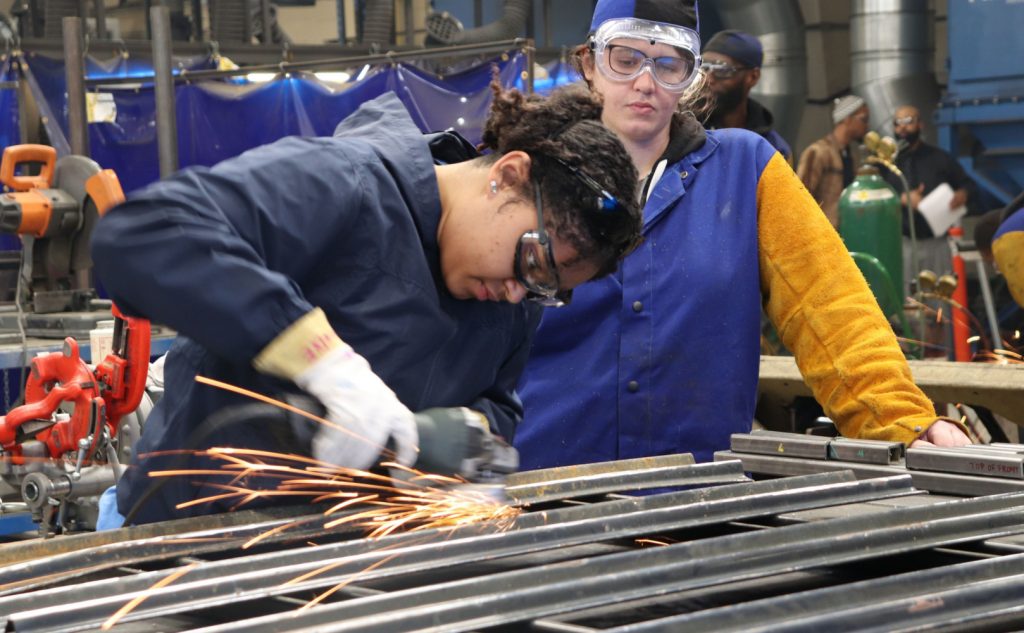The UN considers technical education to be crucial in adapting to future technology. Different UN bodies have mentioned that the purpose of Technical and Vocational Education and Training (TVET) is the development of literacy, transversal, and citizenship skills globally.
A technical degree is a certification acquired after studying a course that teaches certain education courses based on an occupational skill set. Students can opt for this in high school itself, or before they pursue their bachelor’s degree. Some degrees include vocational subjects too.
A technical school program is made to prepare students who know what they want to do professionally and want to start working immediately. However, it’s also a good fit for those who want to change colleges or careers.
This article covers everything you need to know about technical schools. This article is also for those of you who just want to learn something new and add-on to their current skills! Let’s get started, shall we?

The Difference Between Technical Education, Trade Schools, and Vocational Training
-
Learn more about getting a technical degree at NEIT!
Loading…
/**/
What is a Trade School?
Trade schools offer coursework related to a series of skills specific to a certain technical career. While traditional four-year college education from a university offers a wide range of subjects, such as a degree in Liberal Arts, trade schools narrow their curriculum down to hands-on training in a particular profession.
Technical School vs Vocational School
What Are Technical Schools?
Technical schools are also known as technical colleges or institutes and offer an education that prepares students for a specific trade or career. They span up to less than 2 to 4 years depending on the programs you choose. Following the completion of the course, graduates are awarded a degree, certificate, or diploma. Example: this certificate on digital media production.
At a glance, in a tech school you:
- can earn an associate degree, bachelor’s pre-graduate technical degree/certificate
- receive foundational degrees
- learn the theoretical basis and scientific method behind a certain trade
What Are Vocational Schools?
In the United States, these are 2-year colleges that prepare students to directly enter the workforce after receiving an associate’s degree. For example, training in medical coding and billing, degrees, cosmetology, electrical work, etc.
At a glance the programs in these schools:
- offer complete courses and education with certificates of completion
- aim at teaching the practical work behind well-paying technical jobs
What Is A Technical High School?
Similar to technical schools, a technical high school offers a curriculum designed to teach high school students a specific career before they go towards a college education. These schools teach math, science, geography, and other different foundational subjects. Then additionally, they teach how to execute a specific trade.
Benefits typically include helping high school students find, choose, and prepare for a certain career path. It aids their academic journeys while encouraging the students to be more focused on different training programs. It helps them get information on the program of their choice, and from different fields.
These schools frequently offer such training programs in their senior grades and produce students that are equipped with a high-school diploma, and skills & education in fields that make them ready to embark on their career path right after high school.

The Right Path for You – Choosing Between a Technical School and a Vocational Program
Traditional university education focuses on numerous subjects. Whether it’s private universities or community colleges, a four-year degree may require you to learn subjects like that of liberal arts. But if you want something more specialized towards your career, then choose either tech schooling or a professional education program.
So, out of these two, which one is right for you? It depends on your current career objective. Do you have reliable information on what career you’d like to pursue? Want to invest time in learning theory or in practical training material? Want to study for four years? Or would you rather graduate after two years?
What Can I Do After Technical School?
There are numerous career paths to pursue:
Auto mechanics
If you like cars and want to find out more about the mechanics, electronics, and additional systems involved in car function then you might want to know what an automotive technician is.
After graduation, your responsibilities will include designing, operating, and servicing automobiles. You’ll need to learn how to diagnose and repair the machines. It’s a sought-after job with a median annual salary of $40,710.
HVAC technology
If careers in technology interest you, and you enjoy talking to people on the field, you may enjoy a career in HVAC. This course trains you in many technical aspects, installation methods, basic customer service, sales skills, and troubleshooting. The salary for an HVAC technician, on average, would be $46,126 per annum.
Electrical installation and maintenance
Career options within electrical technology include being a construction/maintenance electrician, a commercial/industrial electrician, or a power system/electro-mechanical technician. This field is necessary for aircraft manufacturers, in the railways, nuclear plants, etc.
Welding or plumbing
Welding has many career opportunities. You could become an aluminum welder, a sub-arc welder, or a fitter. Graduates with less than a 12-month experience can typically earn $40,318 annually. With experience and depending on the job location, your salary might improve. If this is indeed a career field you would like to choose then you might want to know about the best welding schools in the USA.
In plumbing, one must study basic tools, fabrication methods, identify the fitting and usage, drainage, waste and venting, and more. The average salary made by a plumber in 2018 was $53,910.
Culinary arts
Do you love everything about food? Then you may find a career in culinary arts fun and lucrative. You can learn advanced methods of preparation, cooking, and presentation of food if you take up work in this field. On average, you can make $54,215 annually.
What are the Advantages of Pursuing a Degree From a Technical School?
There are many advantages to attending a technical school over an academic university:
Specialized programs
These courses focus on arming you with skills specific to your career. They’re less general and more precise. They’re more career-focused than most 4-year college programs are. A technical school is a good idea for you if you know what you want to do.
Time/cost effectiveness
Since completing these classes takes less time, the overall cost decreases. Many of these colleges offer a 1 or two years long program. This might be interesting and advantageous for those who want to start working as soon as possible. A university graduate may take more time to start working.
Gain experts as mentors
Many instructors in technical schools are highly skilled industry professionals. They’ll be able to give you the hands-on training you may require and update you about the industry trends. You can apply this information after graduation while seeking jobs.
Networking opportunities
From attending career fairs to talking to the instructors (many of whom are industry experts), these colleges give ample networking opportunities. These are a few sure ways to find a job after you graduate.
Work experience while you study
One of the best things about these colleges is the internships they provide as a part of the coursework. Not only does this prepare you for the real job world, but you also get great networking opportunities. This also enables you to explore different companies.

Flexible hours
Students who are already working and studying simultaneously will appreciate the flexible hours that many technical schools offer. Night classes or weekend classes are helpful for older students and those with multiple commitments. A normal university may not give such options.
Higher rate of admission
Entrance criteria for students tend to be less stringent in a technical school, making the rate of admission higher. You won’t have to worry about your GPA or test scores as much as you would have to in a traditional 4-year college or university.
Smaller classroom strength
The class strength tends to be smaller – expect more attention and training from your instructor. This can be beneficial to those who prefer a personalized learning experience.
Why is New England Institute of Technology a Good Choice?
The New England Institute of Technology, located in Rhode Island, is a non-profit technical university that offers over 50 various programs. These include bachelor’s degrees and associate degrees. All created by industry experts.
The courses are affordable and accredited by leading academic bodies. They also provide assistance to current students and NEIT alumni. Their students are placed in some of the best global companies from across the country.
START YOUR PROFESSIONAL BUILDING TRADES CAREER
Earn your degree in Professional Building Trades from NEIT and begin your new career path today!
ASSOCIATE'S DEGREE
Student life there is also diverse and colorful. The ‘smart’ campus includes a cutting-edge student center, exercise studio, and more. Take a virtual look around the campus:
Planning out your professional future is a daunting task. Informed navigation through these options can be difficult. However, NEIT can help you commit to a decision with their years of expertise and experience. Reach out to them here.
START YOUR PROFESSIONAL BUILDING TRADES CAREER
Earn your degree in Professional Building Trades from NEIT and begin your new career path today!
ASSOCIATE'S DEGREE
FAQS
What’s a general education college? What is a technical college? And what’s the difference between them?
A college or a university typically offers a 4-year course that provides general education. A traditional college gives students a wider set of subject matter to study. Technical schools offer specialized courses designed to get students job-ready as soon as possible.
What’s an example of a technical school?
An example of a tech school is the New England Institute of Technology. This is one of the most reputed technical vocational schools in the country. The institute teaches programs on a variety of highly specialized careers. Apply to a program that is related to the fields you are interested in.
What does a technical school mean?
A technical school’s definition is an institution that:
- Teaches the technical knowledge and practical skills needed for a particular job
- Is focused on being cost and time effective compared to 4-year long college courses
- Helps you get into the professional world quicklyWhat are degrees from technical schools called?
Associate degree or a bachelor’s pre-graduate technical degree/certificate.

